- Home
- Vladimir Nabokov
Despair
Despair Read online
BOOKS BY Vladimir Nabokov
NOVELS
Mary
King, Queen, Knave
The Defense
The Eye
Glory
Laughter in the Dark
Despair
Invitation to a Beheading
The Gift
The Real Life of Sebastian Knight
Bend Sinister
Lolita
Pnin
Pale Fire
Ada or Ardor: A Family Chronicle
Transparent Things
Look at the Harlequins!
SHORT FICTION
Nabokov's Dozen
A Russian Beauty and Other Stories
Tyrants Destroyed and Other Stories
Details of a Sunset and Other Stories
The Enchanter
DRAMA
The Waltz Invention
Lolita: A Screenplay
The Man from the USSR and Other Plays
AUTOBIOGRAPHY AND INTERVIEWS
Speak, Memory: An Autobiography Revisited
Strong Opinions
BIOGRAPHY AND CRITICISM
Nikolai Gogol
Lectures on Literature
Lectures on Russian Literature
Lectures on Don Quixote
TRANSLATIONS
Three Russian Poets: Translations of Pushkin,
Lermontov, and Tiutchev
A Hero of Our Time (Mikhail Lermontov)
The Song of Igor's Campaign (Anon.)
Eugene Onegin (Alexander Pushkin)
LETTERS
Dear Bunny, Dear Volodya:
The Nabokov-Wilson Letters, 1940-1977
Vladimir Nabokov: Selected Letters, 1940-1977
MISCELLANEOUS
Poems and Problems
The Annotated Lolita
First Vintage International Edition, May 1989
Copyright (c) 1965, 1966 by Vladimir Nabokov All rights reserved under International and Pan-American Copyright Conventions. Published in the United States by Random House, Inc., New York. Originally published, in hardcover, by the Putnam Publishing Group, Inc., New York, in 1966. This edition published by arrangement with the Estate of Vladimir Nabokov.
A somewhat briefer version of this novel originally appeared in Playboy.
Library of Congress Cataloging-in-Publication Data
Nabokov, Vladimir Vladimirovich, 1899-1977.
Despair: a novel.
(Vintage international)
Translation of: Otchaianie.
Originally published: New York: G.P. Putnam's Sons, 1966.
I. Title.
PG3476.N3083 1989 813'.54 88-40533
eISBN: 978-0-30778766-8
Cover art by Jason Fulford and Tamara Shopsin
Cover photograph by Alison Gootee
v3.1
To Vera
Contents
Cover
Other Books by This Author
Title Page
Copyright
Dedication
Foreword
Chapter One
Chapter Two
Chapter Three
Chapter Four
Chapter Five
Chapter Six
Chapter Seven
Chapter Eight
Chapter Nine
Chapter Ten
Chapter Eleven
About the Author
Books by Vladimir Nabokov
Foreword
The Russian text of Despair (Otchayanie--a far more sonorous howl) was written in 1932, in Berlin. The emigre review Sovremennye Zapiski, in Paris, serialized it in the course of 1934, and the emigre publishing house Petropolis, in Berlin, published the book in 1936. As has happened in the case of all my other works, Otchayanie (despite Hermann's conjecture) is banned in the prototypical police state.
At the end of 1936, while I was still living in Berlin--where another beastliness had started to megaphone--I translated Otchayanie for a London publisher. Although I had been scribbling in English all my literary life in the margin, so to say, of my Russian writings, this was my first serious attempt (not counting a wretched poem in a Cambridge University review, circa 1920) to use English for what may be loosely termed an artistic purpose. The result seemed to me stylistically clumsy, so I asked a rather grumpy Englishman, whose services I obtained through an agency in Berlin, to read the stuff; he found a few solecisms in the first chapter, but then refused to continue, saying he disapproved of the book; I suspect he wondered if it might not have been a true confession.
In 1937 John Long Limited, of London, brought out Despair in a convenient edition with a catalogue raisonne of their publications at the back. Despite that bonus, the book sold badly, and a few years later a German bomb destroyed the entire stock. The only copy extant is, as far as I know, the one I own--but two or three may still be lurking amidst abandoned reading matter on the dark shelves of seaside boarding houses from Bournemouth to Tweedmouth.
For the present edition I have done more than revamp my thirty-year-old translation: I have revised Otchayanie itself. Lucky students who may be able to compare the three texts will also note the addition of an important passage which had been stupidly omitted in more timid times. Is this fair, is this wise from a scholar's point of view? I can readily imagine what Pushkin might have said to his trembling paraphrasts; but I also know how pleased and excited I would have been in 1935 had I been able to foreread this 1965 version. The ecstatic love of a young writer for the old writer he will be some day is ambition in its most laudable form. This love is not reciprocated by the older man in his larger library, for even if he does recall with regret a naked palate and a rheumless eye, he has nothing but an impatient shrug for the bungling apprentice of his youth.
Despair, in kinship with the rest of my books, has no social comment to make, no message to bring in its teeth. It does not uplift the spiritual organ of man, nor does it show humanity the right exit. It contains far fewer "ideas" than do those rich vulgar novels that are acclaimed so hysterically in the short echo-walk between the ballyhoo and the hoot. The attractively shaped object or Wiener-schnitzel dream that the eager Freudian may think he distinguishes in the remoteness of my wastes will turn out to be on closer inspection a derisive mirage organized by my agents. Let me add, just in case, that experts on literary "schools" should wisely refrain this time from casually dragging in "the influence of German Impressionists": I do not know German and have never read the Impressionists--whoever they are. On the other hand, I do know French and shall be interested to see if anyone calls my Hermann "the father of existentialism."
The book has less White-Russian appeal than have my other emigre novels; * hence it will be less puzzling and irritating to those readers who have been brought up on the leftist propaganda of the thirties. Plain readers, on the other hand, will welcome its plain structure and pleasing plot--which, however, is not quite as familiar as the writer of the rude letter in Chapter Eleven assumes it to be.
There are many entertaining conversations throughout the book, and the final scene with Felix in the wintry woods is of course great fun.
I am unable to foresee and to fend inevitable attempts to find in the alembics of Despair something of the rhetorical venom that I injected into the narrator's tone in a much later novel. Hermann and Humbert are alike only in the sense that two dragons painted by the same artist at different periods of his life resemble each other. Both are neurotic scoundrels, yet there is a green lane in Paradise where Humbert is permitted to wander at dusk once a year; but Hell shall never parole Hermann.
The line and fragments of lines Hermann mutters in Chapter Four come from Pushkin's short poem addressed to his wife in the eighteen-thirties. I give it here in full, in my own translation, with the retent
ion of measure and rhyme, a course that is seldom advisable--nay, admissible--except at a very special conjunction of stars in the firmament of the poem, as obtains here.
'Tis time, my dear, 'tis time. The heart demands repose.
Day after day flits by, and with each hour there goes
A little bit of life; but meanwhile you and I
Together plan to dwell ... yet lo! 'tis then we die.
There is no bliss on earth: there's peace and freedom, though.
An enviable lot I long have yearned to know:
Long have I, weary slave, been contemplating flight
To a remote abode of work and pure delight.
The "remote abode" to which mad Hermann finally scurries is economically located in the Roussillon where three years earlier I had begun writing my chess novel, The Defense. We leave Hermann there at the ludicrous height of his discomfiture. I do not remember what happened to him eventually. After all, fifteen other books and twice as many years have intervened. I cannot even recall if that film he proposed to direct was ever made by him.
--VLADIMIR NABOKOV
March 1, 1965
Montreux
* This did not prevent a Communist reviewer (J. P. Sartre), who devoted in 1939 a remarkably silly article to the French translation of Despair, from saying that "both the author and the main character are the victims of the war and the emigration."
Chapter One
If I were not perfectly sure of my power to write and of my marvelous ability to express ideas with the utmost grace and vividness ... So, more or less, I had thought of beginning my tale. Further, I should have drawn the reader's attention to the fact that had I lacked that power, that ability, et cetera, not only should I have refrained from describing certain recent events, but there would have been nothing to describe, for, gentle reader, nothing at all would have happened. Silly perhaps, but at least clear. The gift of penetrating life's devices, an innate disposition toward the constant exercise of the creative faculty could alone have enabled me ... At this point I should have compared the breaker of the law which makes such a fuss over a little spilled blood, with a poet or a stage performer. But as my poor left-handed friend used to put it: philosophic speculation is the invention of the rich. Down with it.
It may look as though I do not know how to start. Funny sight, the elderly gentleman who comes lumbering by, jowl flesh flopping, in a valiant dash for the last bus, which he eventually overtakes but is afraid to board in motion and so, with a sheepish smile, drops back, still going at a trot. Is it that I dare not make the leap? It roars, gathers speed, will presently vanish irrevocably around the corner, the bus, the motorbus, the mighty montibus of my tale. Rather bulky imagery, this. I am still running.
My father was a Russian-speaking German from Reval, where he went to a famous agricultural college. My mother, a pure Russian, came from an old princely stock. On hot summer days, a languid lady in lilac silks, she would recline in her rocking chair, fanning herself, munching chocolate, all the blinds down, and the wind from some new-mown field making them billow like purple sails.
During the war, I was interned as a German subject ... jolly bad luck, considering that I had just entered the University of St. Petersburg. From the end of 1914 to the middle of 1919 I read exactly one thousand and eighteen books ... kept count of them. On my way to Germany I was stranded for three months in Moscow and got married there. Since 1920, I had been living in Berlin. On the ninth of May 1930, having passed the age of thirty-five ...
A slight digression: that bit about my mother was a deliberate lie. In reality, she was a woman of the people, simple and coarse, sordidly dressed in a kind of blouse hanging loose at the waist. I could, of course, have crossed it out, but I purposely leave it there as a sample of one of my essential traits: my light-hearted, inspired lying.
Well, as I was saying, the ninth of May 1930 found me on a business trip to Prague. My business was chocolate. Chocolate is a good thing. There are damsels who like only the bitter kind ... fastidious little prigs. (Don't quite see why I write in this vein.)
My hands tremble, I want to shriek or to smash something with a bang.... This mood is hardly suitable for the bland unfolding of a leisurely tale. My heart is itching, a horrible sensation. Must be calm, must keep my head. No good going on otherwise. Quite calm. Chocolate, as everybody knows ... (let the reader imagine here a description of its making). Our trademark on the wrapper showed a lady in lilac, with a fan. We were urging a foreign firm on the verge of bankruptcy to convert their manufacturing process to that of ours to supply Czechoslovakia, and so that was how I came to be in Prague. On the morning of the ninth of May I left my hotel in a taxi which took me ... Dull work recounting all this. Bores me to death. But yearn as I may to reach the crucial point quickly, a few preliminary explanations seem necessary. So let us have done with them: the firm's office happened to be on the very outskirts of the town and I did not find the fellow I wanted. They told me he would be back in an hour or so....
I think I ought to inform the reader that there has just been a long interval. The sun has had time to set, touching up on its way down with sanguine the clouds above the Pyrenean mountain that so resembles Fujiyama. I have been sitting in a queer state of exhaustion, now listening to the rushing and crashing of the wind, now drawing noses in the margin of the page, now slipping into a vague slumber, and then starting up all aquiver. And again there would grow in me that prickly feeling, that unendurable twitter ... and my will lay limp in an empty world.... I had to make a great effort in order to switch on the light and stick in a new nib. The old one had got chipped and bent and now looks like the beak of a bird of prey. No, these are not the throes of creation ... but something quite different.
Well, as I was saying, the man was out, would be back in an hour. Having nothing better to do I went for a stroll. It was a fast, fresh, blue-dappled day; the wind, a distant relation of the one here, winged its course along the narrow streets; a cloud every now and then palmed the sun, which reappeared like a conjurer's coin. The public garden, where invalids were hand-pedaling about, was a storm of heaving lilac bushes. I looked at shop signs; picked out some word concealing a Slav root familiar to me, though overgrown with an unfamiliar meaning. I wore new yellow gloves and kept swinging my arms as I rambled on aimlessly. Then all of a sudden the row of houses broke, disclosing a vast stretch of land that at first glance seemed to me most rural and alluring.
After passing some barracks, in front of which a soldier was exercising a white horse, I trod upon soft sticky soil; dandelions trembled in the wind and a shoe with a hole in it was basking in the sunshine under a fence. Farther on, a hill, splendidly steep, sloped up into the sky. Decided to climb it. Its splendor proved to be a deception. Among stunted beeches and elder shrubs a zigzag path with steps hewn into it went up and up. I fancied at first that after the very next turning I should reach a spot of wild and wonderful beauty, but it never showed itself. That drab vegetation could not satisfy me. The shrubs straggled on bare ground, polluted all over with scraps of paper, rags, battered tins. One could not leave the steps of the path, for it dug very deep into the incline; and on either side tree roots and scrags of rotting moss stuck out of its earthen walls like the broken springs of decrepit furniture in a house where a madman had dreadfully died. When at last I reached the summit I found there a few shacks standing awry, a washing line, and on it some pants bloated with the wind's sham life.
I put both elbows on the gnarled wooden railing and, looking down, saw, far below and slightly veiled by mist, the city of Prague; shimmering roofs, smoking chimneys, the barracks I had just passed, a tiny white horse.
Resolving to descend by another way, I took the highroad which I found beyond the shacks. The only beautiful thing in the landscape was the dome of a gasholder on a hill: round and ruddy against the blue sky, it looked like a huge football. I left the road and began to climb again, this time up a thinly turfed slope. Dreary and barren country. The
rattle of a truck came from the road, then a cart passed in the opposite direction, then a cyclist, then, vilely painted rainbow-wise, the motor van of a firm of varnishers. In those rascals' spectrum the green band adjoined the red.
For some time I remained gazing at the road from the slope; then turned, went on, found a blurry trail running between two humps of bald ground, and after a while looked about for a place to rest. At some distance from me under a thornbush, flat on his back and with a cap on his face, there sprawled a man. I was about to pass, but something in his attitude cast a queer spell over me: the emphasis of that immobility, the lifelessness of those widespread legs, the stiffness of that half-bent arm. He was dressed in a dark coat and worn corduroy trousers.
"Nonsense," I told myself. "Asleep, merely asleep. No reason for me to intrude." But nevertheless I approached, and with the toe of my elegant shoe flicked the cap off his face.
Trumpets, please! Or still better, that tattoo which goes with a breathless acrobatic stunt. Incredible! I doubted the reality of what I saw, doubted my own sanity, felt sick and faint--honestly I was forced to sit down, my knees were shaking so.
Now, if another had been in my place and had seen what I saw, he might perhaps have burst into roars of laughter. As for me I was too dazed by the mystery implied. While I looked, everything within me seemed to lose hold and come hurtling down from a height of ten stories. I was gazing at a marvel. Its perfection, its lack of cause and object, filled me with a strange awe.
At this point, now that I have got to the important part and quenched the fire of that itching, it is meet, I presume, that I should bid my prose stand at ease and, quietly retracing my steps, try to define my exact mood that morning, and the way my thoughts wandered when, after not finding the firm's agent in, I went for that walk, scaled that hill, stared at the red rotundity of that gasholder against the blue background of a breezy May day. Let us, by all means, settle that matter. So behold me once again before the encounter, bright-gloved but hatless, still loitering aimlessly. What was going on in my mind? Nothing at all, oddly enough. I was absolutely empty and thus comparable to some translucid vessel doomed to receive contents as yet unknown. Whiffs of thoughts relating to the business in hand, to the car I had recently acquired, to this or that feature of the surrounding country, played, as it were, on the outside of my mind, and if anything did echo in my vast inward wilderness it was merely the dim sensation of some force driving me along.

 Lolita
Lolita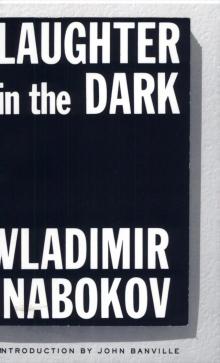 Laughter in the Dark
Laughter in the Dark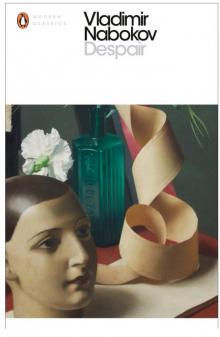 Despair
Despair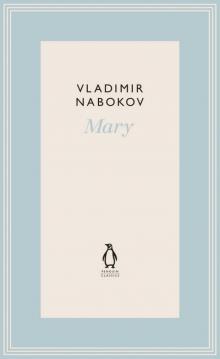 Mary
Mary The Enchanter
The Enchanter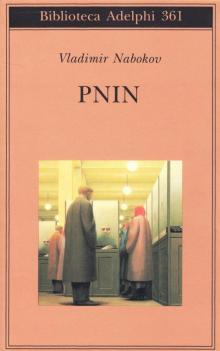 Pnin
Pnin Transparent Things
Transparent Things The Real Life of Sebastian Knight
The Real Life of Sebastian Knight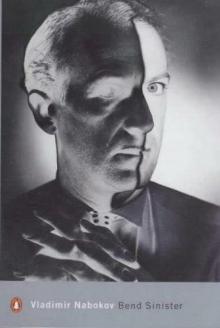 Bend Sinister
Bend Sinister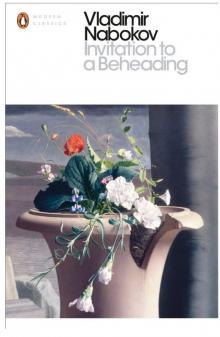 Invitation to a Beheading
Invitation to a Beheading The Stories of Vladimir Nabokov
The Stories of Vladimir Nabokov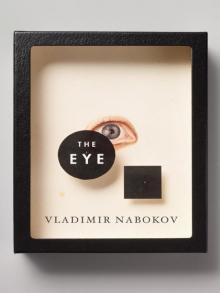 The Eye
The Eye Letters to Véra
Letters to Véra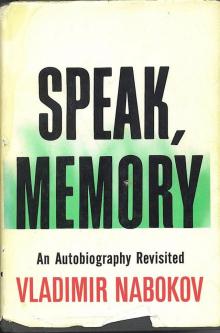 Speak, Memory
Speak, Memory The Gift
The Gift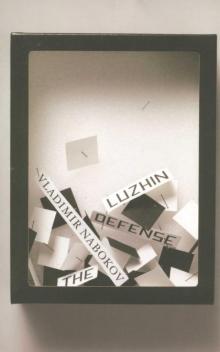 The Luzhin Defense
The Luzhin Defense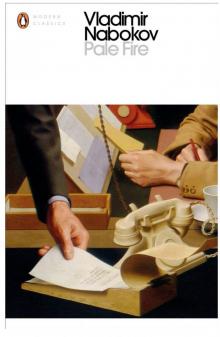 Pale Fire
Pale Fire Glory
Glory Man From the USSR & Other Plays
Man From the USSR & Other Plays Vladimir Nabokov: Selected Letters 1940-1977
Vladimir Nabokov: Selected Letters 1940-1977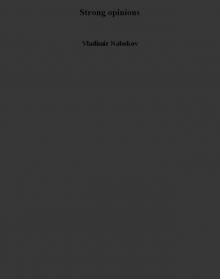 Strong opinions
Strong opinions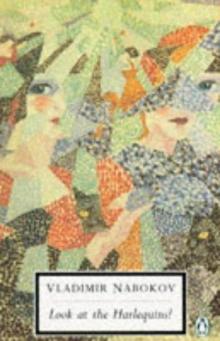 Look at the Harlequins!
Look at the Harlequins!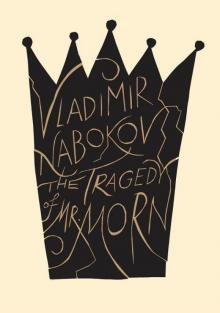 The Tragedy of Mister Morn
The Tragedy of Mister Morn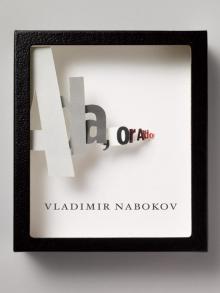 Ada, or Ardor
Ada, or Ardor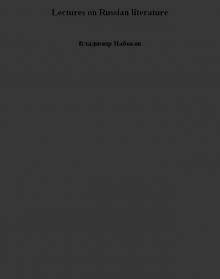 Lectures on Russian literature
Lectures on Russian literature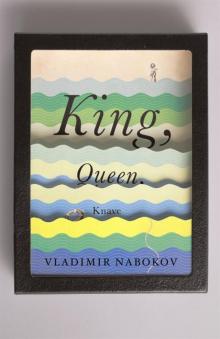 King, Queen, Knave
King, Queen, Knave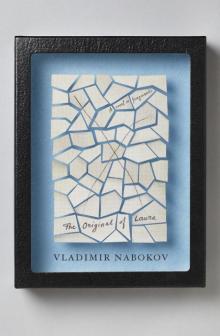 The Original of Laura
The Original of Laura